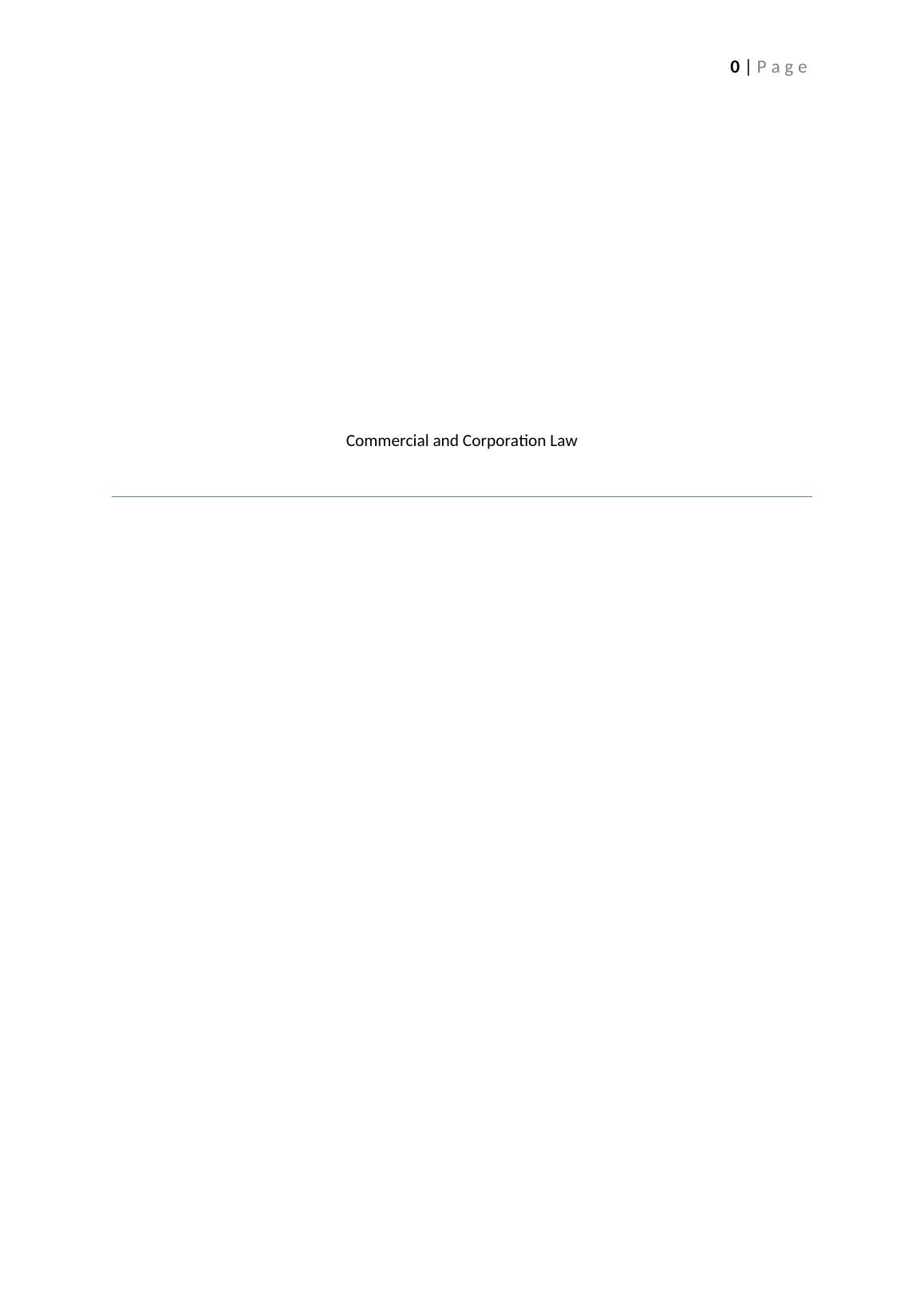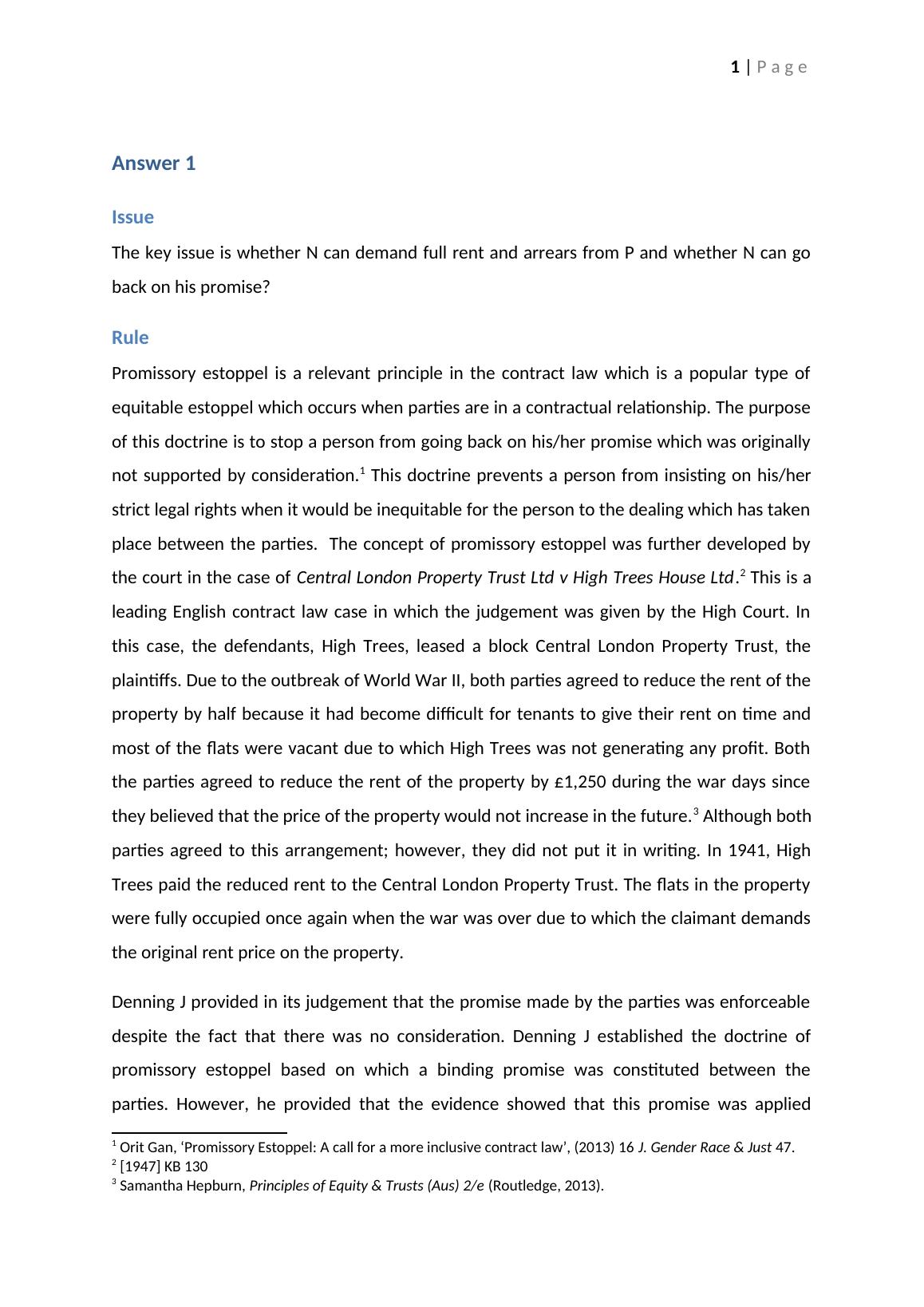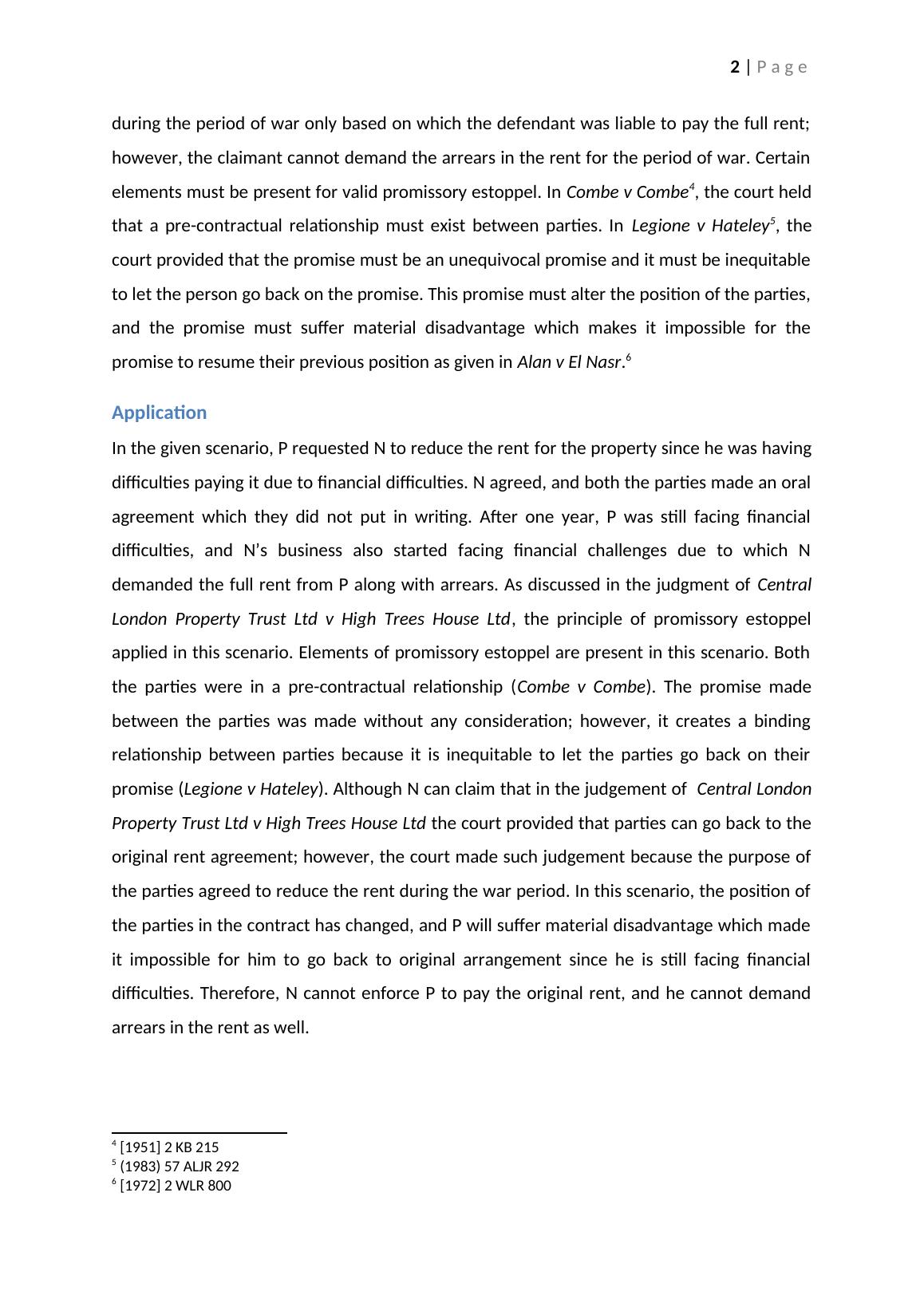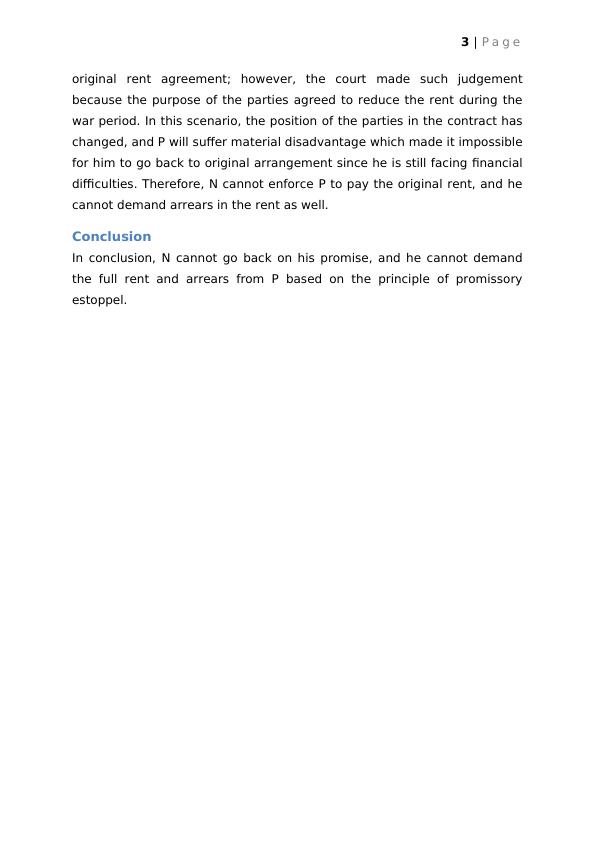Misrepresentation in Contract Law
Added on 2023-01-10
11 Pages2799 Words65 Views
0 | P a g e
Commercial and
Corporation Law
Commercial and
Corporation Law

1 | P a g e
Answer 1
Issue
The key issue is whether N can demand full rent and arrears from P and
whether N can go back on his promise?
Rule
Promissory estoppel is a relevant principle in the contract law which is a
popular type of equitable estoppel which occurs when parties are in a
contractual relationship. The purpose of this doctrine is to stop a person
from going back on his/her promise which was originally not supported by
consideration.1 This doctrine prevents a person from insisting on his/her
strict legal rights when it would be inequitable for the person to the
dealing which has taken place between the parties. The concept of
promissory estoppel was further developed by the court in the case ofCentral London Property Trust Ltd v High Trees House Ltd.2 This is a
leading English contract law case in which the judgement was given by
the High Court. In this case, the defendants, High Trees, leased a block
Central London Property Trust, the plaintiffs. Due to the outbreak of World
War II, both parties agreed to reduce the rent of the property by half
because it had become difficult for tenants to give their rent on time and
most of the flats were vacant due to which High Trees was not generating
any profit. Both the parties agreed to reduce the rent of the property by
£1,250 during the war days since they believed that the price of the
property would not increase in the future.3 Although both parties agreed
to this arrangement; however, they did not put it in writing. In 1941, High
Trees paid the reduced rent to the Central London Property Trust. The
flats in the property were fully occupied once again when the war was
over due to which the claimant demands the original rent price on the
property.
1 Orit Gan, ‘Promissory Estoppel: A call for a more inclusive contract law’, (2013) 16
J.
Gender Race & Just 47.
2 [1947] KB 130
3 Samantha Hepburn,
Principles of Equity & Trusts (Aus) 2/e (Routledge, 2013).
Answer 1
Issue
The key issue is whether N can demand full rent and arrears from P and
whether N can go back on his promise?
Rule
Promissory estoppel is a relevant principle in the contract law which is a
popular type of equitable estoppel which occurs when parties are in a
contractual relationship. The purpose of this doctrine is to stop a person
from going back on his/her promise which was originally not supported by
consideration.1 This doctrine prevents a person from insisting on his/her
strict legal rights when it would be inequitable for the person to the
dealing which has taken place between the parties. The concept of
promissory estoppel was further developed by the court in the case ofCentral London Property Trust Ltd v High Trees House Ltd.2 This is a
leading English contract law case in which the judgement was given by
the High Court. In this case, the defendants, High Trees, leased a block
Central London Property Trust, the plaintiffs. Due to the outbreak of World
War II, both parties agreed to reduce the rent of the property by half
because it had become difficult for tenants to give their rent on time and
most of the flats were vacant due to which High Trees was not generating
any profit. Both the parties agreed to reduce the rent of the property by
£1,250 during the war days since they believed that the price of the
property would not increase in the future.3 Although both parties agreed
to this arrangement; however, they did not put it in writing. In 1941, High
Trees paid the reduced rent to the Central London Property Trust. The
flats in the property were fully occupied once again when the war was
over due to which the claimant demands the original rent price on the
property.
1 Orit Gan, ‘Promissory Estoppel: A call for a more inclusive contract law’, (2013) 16
J.
Gender Race & Just 47.
2 [1947] KB 130
3 Samantha Hepburn,
Principles of Equity & Trusts (Aus) 2/e (Routledge, 2013).

2 | P a g e
Denning J provided in its judgement that the promise made by the parties
was enforceable despite the fact that there was no consideration. Denning
J established the doctrine of promissory estoppel based on which a
binding promise was constituted between the parties. However, he
provided that the evidence showed that this promise was applied during
the period of war only based on which the defendant was liable to pay the
full rent; however, the claimant cannot demand the arrears in the rent for
the period of war. Certain elements must be present for valid promissory
estoppel. In
Combe v Combe4, the court held that a pre-contractual
relationship must exist between parties. In
Legione v Hateley5, the court
provided that the promise must be an unequivocal promise and it must be
inequitable to let the person go back on the promise. This promise must
alter the position of the parties, and the promise must suffer material
disadvantage which makes it impossible for the promise to resume their
previous position as given in
Alan v El Nasr.6
Application
In the given scenario, P requested N to reduce the rent for the property
since he was having difficulties paying it due to financial difficulties. N
agreed, and both the parties made an oral agreement which they did not
put in writing. After one year, P was still facing financial difficulties, and
N’s business also started facing financial challenges due to which N
demanded the full rent from P along with arrears. As discussed in the
judgment of
Central London Property Trust Ltd v High Trees House Ltd,
the principle of promissory estoppel applied in this scenario. Elements of
promissory estoppel are present in this scenario. Both the parties were in
a pre-contractual relationship (
Combe v Combe). The promise made
between the parties was made without any consideration; however, it
creates a binding relationship between parties because it is inequitable to
let the parties go back on their promise (
Legione v Hateley). Although N
can claim that in the judgement of
Central London Property Trust Ltd v
High Trees House Ltd the court provided that parties can go back to the
4 [1951] 2 KB 215
5 (1983) 57 ALJR 292
6 [1972] 2 WLR 800
Denning J provided in its judgement that the promise made by the parties
was enforceable despite the fact that there was no consideration. Denning
J established the doctrine of promissory estoppel based on which a
binding promise was constituted between the parties. However, he
provided that the evidence showed that this promise was applied during
the period of war only based on which the defendant was liable to pay the
full rent; however, the claimant cannot demand the arrears in the rent for
the period of war. Certain elements must be present for valid promissory
estoppel. In
Combe v Combe4, the court held that a pre-contractual
relationship must exist between parties. In
Legione v Hateley5, the court
provided that the promise must be an unequivocal promise and it must be
inequitable to let the person go back on the promise. This promise must
alter the position of the parties, and the promise must suffer material
disadvantage which makes it impossible for the promise to resume their
previous position as given in
Alan v El Nasr.6
Application
In the given scenario, P requested N to reduce the rent for the property
since he was having difficulties paying it due to financial difficulties. N
agreed, and both the parties made an oral agreement which they did not
put in writing. After one year, P was still facing financial difficulties, and
N’s business also started facing financial challenges due to which N
demanded the full rent from P along with arrears. As discussed in the
judgment of
Central London Property Trust Ltd v High Trees House Ltd,
the principle of promissory estoppel applied in this scenario. Elements of
promissory estoppel are present in this scenario. Both the parties were in
a pre-contractual relationship (
Combe v Combe). The promise made
between the parties was made without any consideration; however, it
creates a binding relationship between parties because it is inequitable to
let the parties go back on their promise (
Legione v Hateley). Although N
can claim that in the judgement of
Central London Property Trust Ltd v
High Trees House Ltd the court provided that parties can go back to the
4 [1951] 2 KB 215
5 (1983) 57 ALJR 292
6 [1972] 2 WLR 800

3 | P a g e
original rent agreement; however, the court made such judgement
because the purpose of the parties agreed to reduce the rent during the
war period. In this scenario, the position of the parties in the contract has
changed, and P will suffer material disadvantage which made it impossible
for him to go back to original arrangement since he is still facing financial
difficulties. Therefore, N cannot enforce P to pay the original rent, and he
cannot demand arrears in the rent as well.
Conclusion
In conclusion, N cannot go back on his promise, and he cannot demand
the full rent and arrears from P based on the principle of promissory
estoppel.
original rent agreement; however, the court made such judgement
because the purpose of the parties agreed to reduce the rent during the
war period. In this scenario, the position of the parties in the contract has
changed, and P will suffer material disadvantage which made it impossible
for him to go back to original arrangement since he is still facing financial
difficulties. Therefore, N cannot enforce P to pay the original rent, and he
cannot demand arrears in the rent as well.
Conclusion
In conclusion, N cannot go back on his promise, and he cannot demand
the full rent and arrears from P based on the principle of promissory
estoppel.

End of preview
Want to access all the pages? Upload your documents or become a member.
Related Documents
Misrepresentation in Contract Lawlg...
|9
|2569
|1
Misrepresentation in Contract Lawlg...
|9
|2722
|426
Contract Law: Promissory Estoppel and Intention to Create Legal Relationslg...
|10
|2510
|258
Business Law - Assignment Samplelg...
|12
|2436
|114
TMA 01 Contract law and Tort Lawlg...
|7
|2246
|254
Commercial Law vs Corporate Law - Assignmentlg...
|9
|1660
|42
